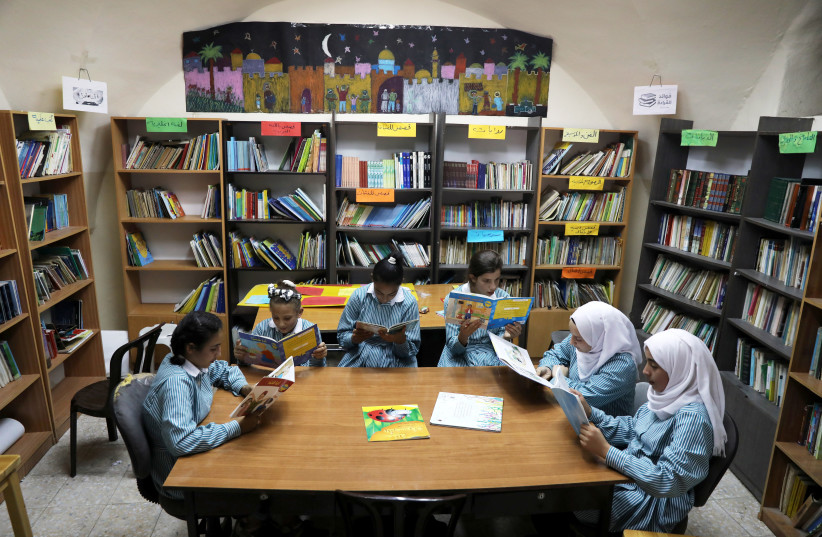The contractors union in the Gaza Strip suspended work for one day on all United Nations Relief and Works Agency (UNRWA) projects, in a protest against the agency's "procrastination in fulfilling financial rights." The limited strike on Tuesday could become total if the union’s demands are not met.
For more stories from The Media Line go to themedialine.org
The roots of the crisis began in 2014 when the UNRWA "stopped paying contractors the value-added tax, 17% of the contracts' value, and asked them to collect it through the Tax Return from the Ramallah-based Ministry of Finance," the head of the Palestinian Contractors Union in Gaza, Alaa-aldin al-Araj, told The Media Line.
Unlike West Bank contractors, Gaza contractors since 2014 have not received payments for the value-added tax whose value today totals nearly $25 million, according to Araj, who confirmed that the contract signed between the UNRWA and the Palestinian Authority in 1994 “provides for exempting the agency from all types of direct and indirect taxes. This means that the exemption is provided to the UNRWA and not for the contractors. Therefore, we hold the UNRWA responsible for paying these amounts, as was the case before 2014."
The UNRWA media office did not reply to a request for comment from The Media Line.
The union also says that the UN agency has not fairly compensated contractors for work performed during the coronavirus pandemic.

"The UNRWA refused to compensate contractors who worked for it during the beginning of COVID-19 pandemic knowing that all the projects implemented during that period incurred exorbitant additional costs due to the high prices of land and sea transport, the scarcity of materials and the enormous increase in its price – some of it rose more than 100%, such as construction steel," Araj said.
Contractors’ losses reached 30% of their contracts' value last year, which pushed the union in Gaza to declare its first strike, that lasted for three months, before securing promises from the UN administration to reconsider the situation. This has not yet happened, however.
Announcing a boycott
As part of the strike plan for this year, the union announced last month a boycott of UNRWA bids, and approved a gradual strike strategy, starting with one day this week and threatening to end with a complete cessation of work if the UNRWA did not respond, by mid-May, to the union’s demands.
Emad Hassouna, owner of the Hassouna Contracting company in Gaza, who is among the affected contractors, told The Media Line that "the UNRWA's refusal to pay our taxes had a catastrophic impact on us, especially in light of the difficult conditions we live in in the Gaza Strip, including the suffocating blockade and the internal division. Many contractors left the field due to bankruptcy and debt accumulation."
"We consulted economic and legal experts, and the result was that the contract between us and the UNRWA is clear and explicit, and they must abide by it, just as we abide by their terms, and they must pay all taxes," he added.
The UNRWA currently is suffering from financial hardship, and some have speculated that this is why it has not been able to hold up its financial end of the contracts.
UNRWA's media advisor, Adnan Abu Hasna, told reporters in Gaza two months ago that the UNRWA is going through its most severe financial crisis in years, and that it would transfer $80 million of its debts to the next year, the largest in its history. The agency is almost completely funded by voluntary contributions.
The UNRWA attitude toward the contractors has nothing to do with its financial plight, Araj asserts.
"If this was the case, the UNRWA could at least recognize our rights and we can reach a settlement through which the amounts can be paid in installments over years in a way that allows the UNRWA to pay it through the contingency fund,” he said. “But the problem is that it doesn't recognize our rights at all!"
The strike, he said, is "a means to obtain our demands and protect our future rights by urging the UNRWA to change its future contracts in line with international standards; to redefine ‘force majeure’ as earthquakes and disasters, and to stress the need for a time extension and financial compensation in those cases."
Tuesday’s strike included suspension of work on dozens of UNRWA projects in different fields, including: schools, health care centers, public facilities, infrastructure upgrades and roads, which will affect the quality of services provided for local residents.
Om Mohammed, a mother of three primary-school-aged children, told The Media Line that these UNRWA projects are essential.
"There are 49 students in my oldest son's class and 52 students in my second son's class. With this large number, it is absolutely impossible for the educational process to proceed properly and healthily, just as it is impossible for us to apply the distancing instructions to prevent the spread of the COVID-19 pandemic. We definitely need more schools to accommodate these numbers of students," she said.
